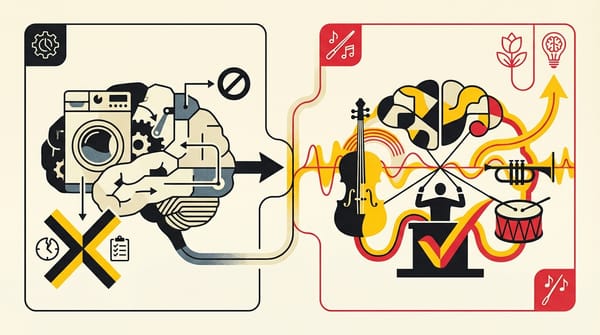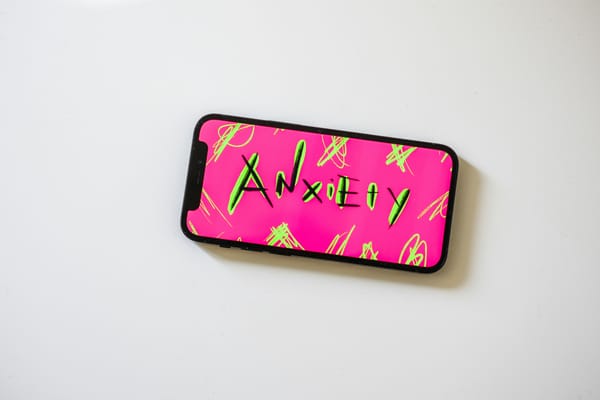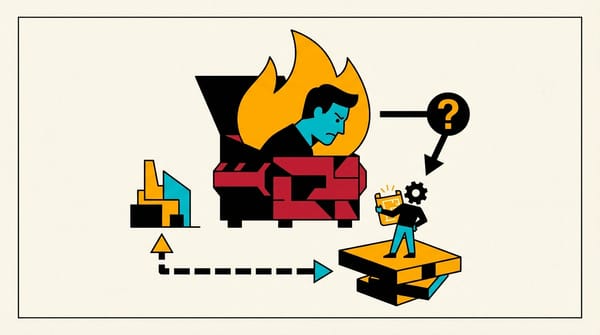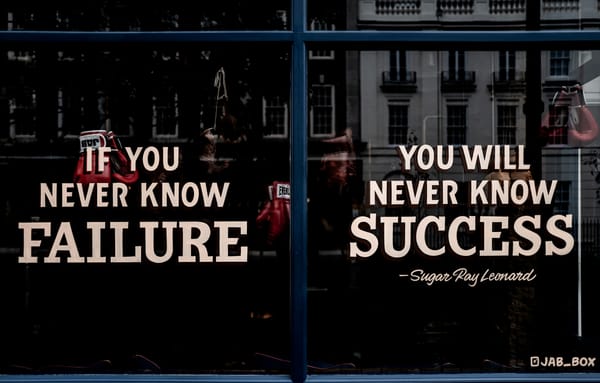The Illusion of Karma and the Power of Self-Creation
Discover how the illusion of karma impacts your life and learn to harness the power of self-creation for true personal transformation.

🤖 This podcast is generated using AI technology. Disclaimer: The generated content may contain errors.
In the dimly lit kitchen of my small Spanish apartment, far from the bustling streets of Moscow where I built my career, my friend Vika and I were immersed in deep conversation. Our prosecco had long since turned warm as we delved into the intricacies of belief systems, from the grand tapestries of religion to the subtle threads of psychosomatics.
During our talk, I found myself reflecting on the strange turns of fate that brought me here. Once a promising young professional in Russia, now an immigrant rebuilding my life in a country where the language still feels foreign. I won't pretend otherwise - I write in Russian and think in Russian, only translating the text afterward. This experience led me to a rather controversial conclusion: karma, that cosmic ledger of justice we're all supposed to believe in, simply doesn't exist.
Before dismissing this as the bitter musings of someone who's had it rough, let me explain. The concept of karma isn't just a spiritual belief; it's a psychological crutch. It's humanity's way of making sense of a world that often seems meaningless, finding patterns in the chaos of existence. We cling to the idea that good deeds will be rewarded and bad ones punished because the alternative - a universe indifferent to our moral choices - is frankly terrifying.
But here's the liberating truth I've embraced: in a world without karma, we have the power to recreate ourselves at any moment.
Think about it. From birth, we're programmed - by parents, society, circumstances. Sometimes this programming serves us well, but often it burdens us with traumas, limiting beliefs, and behaviors that hold us back. The beauty of realizing there's no cosmic accountant is that we can take full responsibility for reprogramming ourselves.
This isn't about "affirmations" - a word so overused it's lost all meaning. No, I prefer the term "self-programming." It's a more direct, more honest approach to what we're trying to achieve. We're not asking the universe for favors; we're rewriting our own code.
Here's how I started approaching this in my life:
- Identify outdated programming: What beliefs or behavior patterns are holding you back? For me, it was the idea that the world is a terrible place: only bad things happen, always prepare for the worst, success only comes through hard work, and so on. While this mindset configuration actually leads me down exactly this path, I can start thinking differently, and only then will I be able to see things differently.
- Create specific, actionable statements for self-programming: Instead of vague affirmations like "I am successful," I use statements like "I approach each challenge as an opportunity to learn and grow."
- This is major ongoing daily work: neural pathways with destructive beliefs have been forming since childhood over many years, it will take long-term work to break them down and create new ones.
- Visualize the new reality: While repeating your self-programming statements, create a vivid mental image of yourself embodying these new beliefs and behaviors.
- I recommend using a paper notebook, pen, and special sounds for meditation, recovery, crystals, or any other practice that relaxes you and induces a light trance, where you can accept new beliefs without meeting resistance from old ones. If possible, light a wax or soy candle - this isn't so much about the scent as it is about its absence and the sensation of warmth and vital energy. If you encounter resistance, you can mentally imagine drawing power from the candle's flame, helping you overcome obstacles. All this symbolism isn't so much magic as it is pieces of code that help access the necessary brain configuration in this moment. These tricks are used by almost all world religions, and depending on what you believe, you can see this as divine manifestation, the power of nature, or keys to the boundary between consciousness and unconsciousness. The main thing is that it works; why it works isn't so important in our case 😅.
- Act "as if": Start behaving in accordance with your new programming, even when it's uncomfortable. Remember: you're not just creating a new reality - you're learning to see it differently. Reality is one, but there are as many projections of this reality as there are people on earth.
- Analyze and adjust: Regularly evaluate how your new programming is affecting your life. Be ready to make necessary adjustments.
This process isn't always easy. There are days when I fall back into old patterns, perceiving failures as personal flaws rather than interesting plot twists in my story. But then I remind myself: I'm the author here. I can rewrite the narrative at any moment.
Is this approach perfect? Hardly. There's always a chance this entire belief system could crumble around me. But isn't that true for any belief system? At least in this one, I believe in my capacity for growth and change rather than some cosmic system of rewards and punishments.
So, my dear friends, I invite you to consider: what if you could redefine your destiny in an instant? What if you could decide right now to become a different person - not because someone demands it, but simply because you choose to?
A dizzying thought, isn't it? But also an exciting one. In a world without karma, we're not bound by our past or by some predetermined fate. We're free to recreate ourselves, again and again.
As we navigate this complex, often puzzling world, perhaps the strongest belief we can hold isn't faith in some external system of justice, but faith in our own capacity for self-creation. After all, in a universe indifferent to our choices, the meaning we create ourselves becomes even more valuable.
Which aspects of yourself are you ready to redefine?
What new reality are you ready to create?
Share your thoughts in the comments. And I'll soon share my self-programming sheet.
The power, my friend, is entirely in your hands.
As always, I invite you to share your opinion in the comments
With love 😽 🤗 😘
K
Framework — Core Principles
- Recognition of Universal Neutrality
- Acknowledging the absence of inherent meaning
- Accepting randomness without seeking cosmic justice
- Transforming "why me?" into "what's next?"
- Identity Reconstruction
- Defining specific, measurable personality characteristics
- Creating concrete behavioral patterns
- Establishing clear feedback mechanisms
- Implementation Structure
- Daily Practice
- Morning reflection (5 minutes)
- Formulate three specific intentions for the day
- Connect each intention to a broader vision
- Identify potential obstacles and solutions
- Evening review (5 minutes)
- Document specific actions taken
- Note unexpected discoveries
- Plan adjustments for tomorrow
- Morning reflection (5 minutes)
- Weekly Integration
- Analyze pattern effectiveness
- Adjust formulations for clarity
- Test new behavioral experiments
Practical Application
- Replacing Abstract Concepts Instead of: "I am successful" Use: "I effectively complete my projects and learn from every experience" Instead of: "I attract good things" Use: "I notice opportunities aligned with my goals and act on them"
- Identity Statements Structure: "I [specific action] because [specific reason]" Example: "I write daily because expressing ideas energizes me"
- Feedback Loop
- Documentation of specific results
- Pattern analysis without judgment
- Adjustment of formulations based on results
Integration Methods
- Morning Protocol
- Reading current programming statements
- Visualization of specific implementations
- Setting measurable daily goals
- Evening Protocol
- Review of daily actions
- Checking alignment with intentions
- Identifying areas for improvement
- Handwriting self-programming while listening to crystal sounds or any other wordless sounds that help you enter a state of trance and restoration, where acceptance of new principles will proceed without resistance from established patterns
- Weekly Review
- Analysis of pattern effectiveness
- Refinement of formulations for clarity
- Planning experiments for the next week
Common Mistakes and Solutions
- Vague Formulations Problem: Using abstract terms Solution: Replace with concrete, observable actions
- Magical Thinking Problem: Expecting passive results Solution: Including action components in each statement
- Resistance Problem: Emergence of old patterns Solution: Documenting and analyzing triggers without judgment
Measurement and Adjustment
- Success Metrics
- Behavioral changes (specific actions taken)
- Emotional reactions (daily measurements)
- External feedback (documented interactions)
- Adjustment Triggers
- Recurring pattern violations
- Emotional resistance
- Integration of new insights
- Evolution Process
- Monthly review of all statements
- Documentation of changes
- Integration of new understandings




